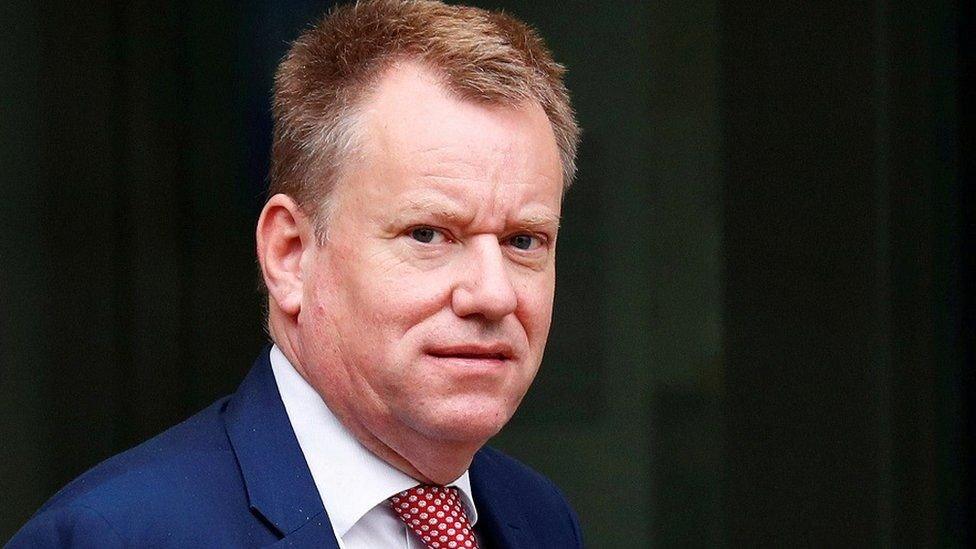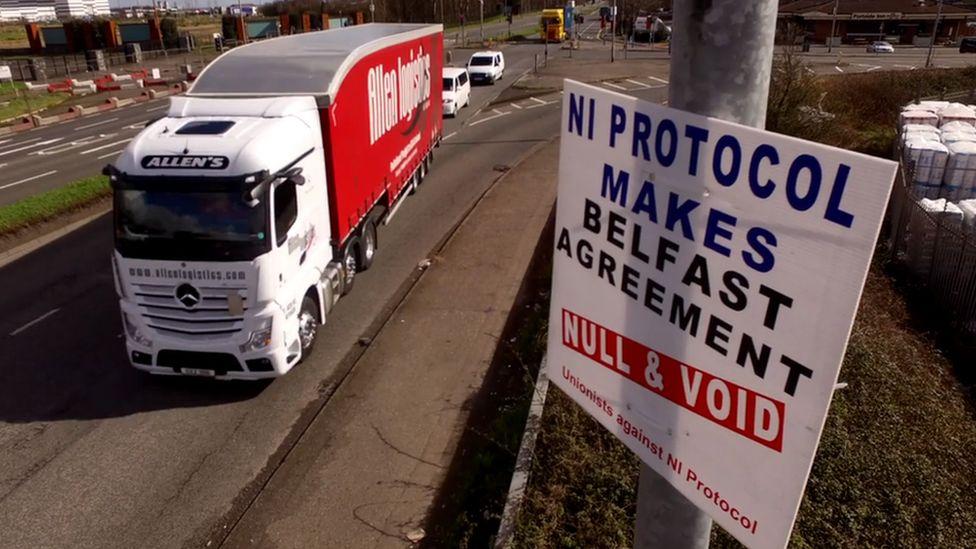NI Protocol: Lord Frost calls for EU agrifood rules move
- Published

Lord Frost negotiated the NI Protocol in 2019, but said it is not being implemented as he intended
The UK's Brexit minister has suggested the EU could change its agrifood rules if it wants the NI Protocol to work.
The protocol means food products must be checked and controlled as they enter Northern Ireland from Great Britain.
Lord Frost said those checks were a political position by the EU and did not depict "some existential reality about the world".
He negotiated the protocol in 2019, but said it is not being implemented as he intended.
The protocol avoids a hard border on the island of Ireland by keeping Northern Ireland in the EU single market for goods.
That means products are checked and controlled as they arrive from Great Britain.
The EU has strict rules on food products entering the single market, so these are subject to the most intense checks.
'What's wrong with Doherty's sausages?' SDLP MP Colum Eastwood poses a question about Brexit to the House of Commons
It was understood by both sides at the time of the deal that it would mean new checks of this sort.
However, the checks have caused difficulties for food and horticulture businesses in Northern Ireland.
Lord Frost told MPs that "the EU could change their rules in the context of Northern Ireland if they wanted to".
"In circumstances where the politics are so delicate and we all say we're trying to support the Good Friday Agreement, then it would seem sensible to look at these things in a more reasonable way."

Strict checks have caused difficulties for food and horticulture businesses in Northern Ireland.
He again rejected the idea that the UK could do a "Swiss-style" agrifood deal with the EU, which would involve the UK continuing to follow EU rules.
The EU's chief negotiator has said such a deal could be done within weeks and could reduce checks on goods by about 80%.
But Lord Frost said it would be "an abrogation of sovereignty" if it involved the rules being enforced through the EU institutions.
Lord Frost gave some details of the UK's agrifood proposal, which is based on equivalence and is known as "New Zealand" style.
That would involve both sides recognising the other as having their own high standards.
If those standards cease to be equivalent, then the level of controls could respond to this.
'The plants are dead when they arrive here' - the disruption caused by the Northern Ireland Protocol has been a recurring theme over the past number of months
Sinn Féin Vice-President Michelle O'Neill said "neither the DUP or David Frost speak for the majority of MLAs, businesses or citizens in the North of Ireland" on Brexit issues.
Ms O'Neill was speaking after a video meeting with the European Commission Vice-President Maros Sefcovic.
"The negative presentation of the protocol by some fails to take account of the benefits and possibilities which can help strengthen our economy, create jobs and give us a competitive advantage as a region," she said.
"We need to have a balanced perspective and we need to reap the benefits of the special status within Europe we now have."
Democratic Unionist Party leader Edwin Poots is also due to meet Mr Sefcovic.
Grace period
The UK's deal with New Zealand does not cover all food products and does not remove the need for certification of food imports.
Lord Frost also told MPs that the UK has asked the EU for an extension of a grace period on chilled meats from Great Britain.
These products are due to be banned in Northern Ireland at the end of June.
He said they had asked for it to be extended "a bit" to allow technical talks to continue.
European Commission spokesman Daniel Ferrie said they were not aware of such a request.
He added that their main aim was to provide "predictability and stability" for Northern Ireland.
- Published2 June 2021

- Published18 May 2021

- Published2 February 2024
